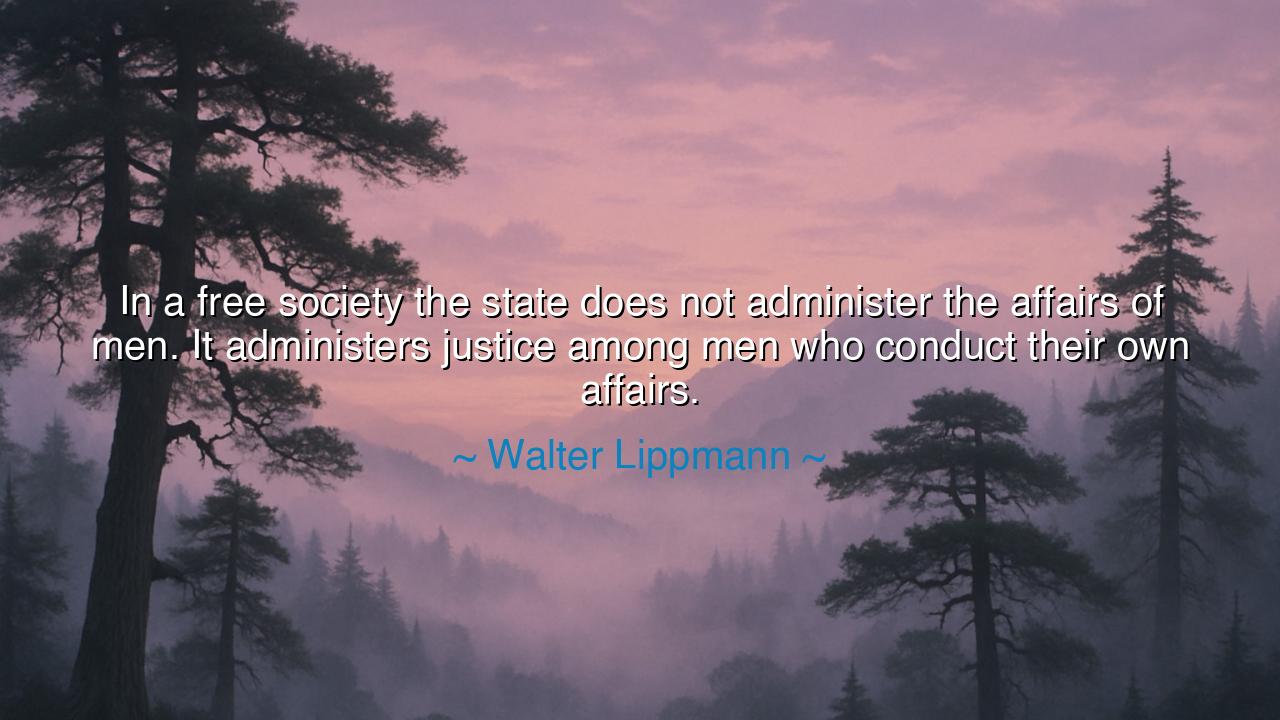
In a free society the state does not administer the affairs of
In a free society the state does not administer the affairs of men. It administers justice among men who conduct their own affairs.






The words of Walter Lippmann, “In a free society the state does not administer the affairs of men. It administers justice among men who conduct their own affairs,” stand as both a definition and a warning. Lippmann, one of the greatest political commentators of the twentieth century, reminds us that the heart of freedom lies not in the omnipresent hand of the state, but in the dignity of individuals governing their own lives. The true purpose of the state, in his vision, is not to manage every detail of existence, but to ensure that the dealings of men with one another are fair, balanced, and just. Where this balance is lost, liberty perishes, and what is called “society” becomes mere servitude.
The origin of this teaching flows from the struggles of modern democracy itself. Lippmann lived in an age when the twentieth century was torn between extremes: on one side, the rise of totalitarian states that sought to control every detail of human life; on the other, the fragile hope of liberal democracies striving to preserve order without extinguishing freedom. To say that the state should “administer justice” and not “administer affairs” was to draw a line against the creeping temptation of control. For he saw that when governments cease to be guardians and become managers of men, they inevitably crush the vitality of a free society.
History offers vivid lessons. Consider the glory and decline of Athens. In its golden age, Athens flourished because citizens governed their own affairs: merchants traded, poets wrote, philosophers taught, and the state existed chiefly to safeguard the justice of their interactions. But when internal conflict grew, when war and faction pressed the state to intrude further into private life, the brilliance of Athens dimmed. The society that once sang with voices of freedom slipped into turmoil, and its legacy reminds us that liberty thrives only when the people themselves hold the power to shape their lives.
By contrast, the empires of despotism—from ancient tyrannies to the totalitarian regimes of the twentieth century—demonstrate the opposite path. In such states, the rulers claimed to direct not only the laws, but the thoughts, the labor, even the spirit of their people. The Soviet Union under Stalin, or Germany under Hitler, sought to administer every affair of men, extinguishing individuality beneath the machinery of the state. Yet history shows us: such regimes may command obedience for a time, but they cannot command the soul. They collapse under the weight of their own oppression, for a society without self-governing men is a society already dead in spirit.
The meaning of Lippmann’s words shines clearly: a free people must carry responsibility for their own affairs. Freedom is not the absence of order, but the presence of self-government. The role of the state is not to parent its citizens, but to safeguard justice so that each person may live, work, and dream in peace. A state that forgets this boundary risks turning its citizens into children, dependent and unfree, while a people that surrenders its affairs to government risks forgetting how to be free.
The lesson for us is eternal: do not ask the state to do what you must do for yourself. Govern your own household with wisdom, conduct your own business with honesty, manage your own disputes with fairness. Let the state’s role be the administration of justice, not the administration of your life. For justice is the shield of liberty, but control is its enemy. A free society endures only when its citizens accept both the burden and the gift of self-rule.
Practical actions are clear. Cultivate independence in your own affairs: take responsibility for your labor, your family, your community. When disputes arise, seek fairness first among yourselves rather than running to authority. Support laws and leaders who strengthen justice, not those who seek to govern every detail of life. And above all, cherish the habits of freedom—dialogue, cooperation, responsibility—so that the state remains a servant and not a master.
Thus let Walter Lippmann’s words be remembered as a commandment of liberty: the state must never replace the self-governing strength of its people. Justice, not domination. Guardianship, not control. For only when men conduct their own affairs, while the state ensures fairness among them, does society breathe with the spirit of true freedom. And when that balance is held, the flame of liberty burns not as a flicker, but as a torch for all generations.






AAdministratorAdministrator
Welcome, honored guests. Please leave a comment, we will respond soon